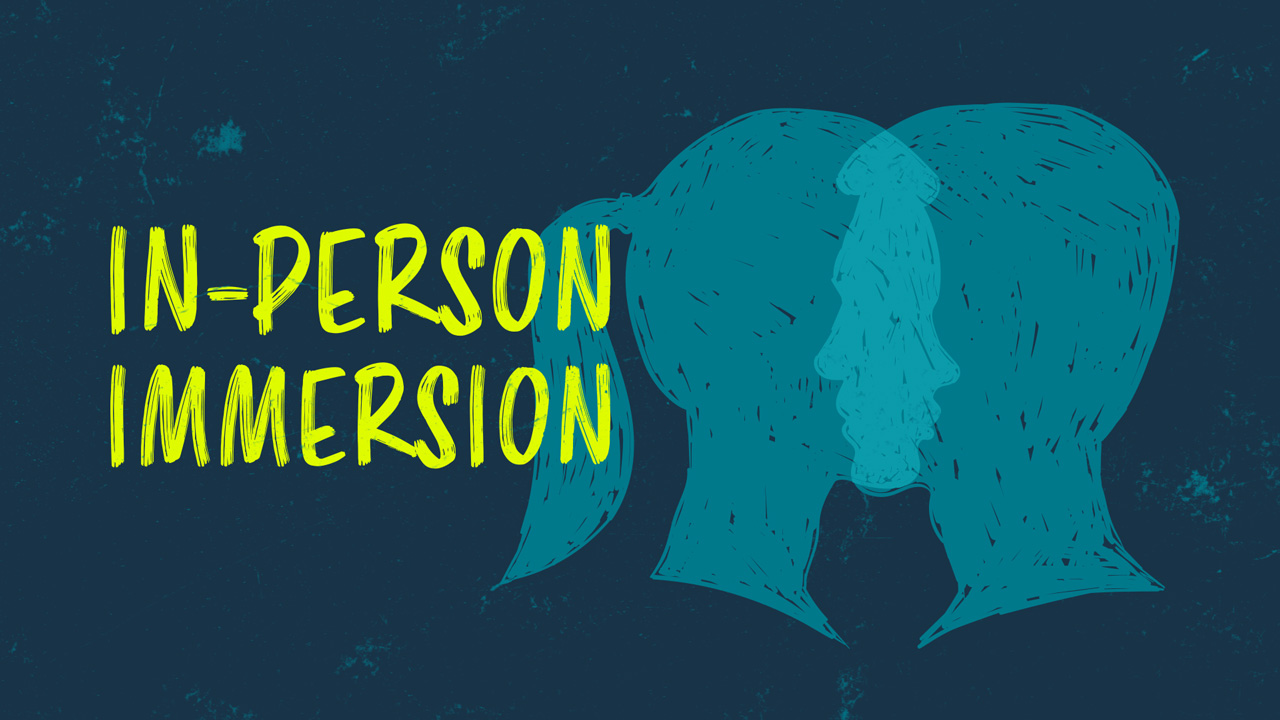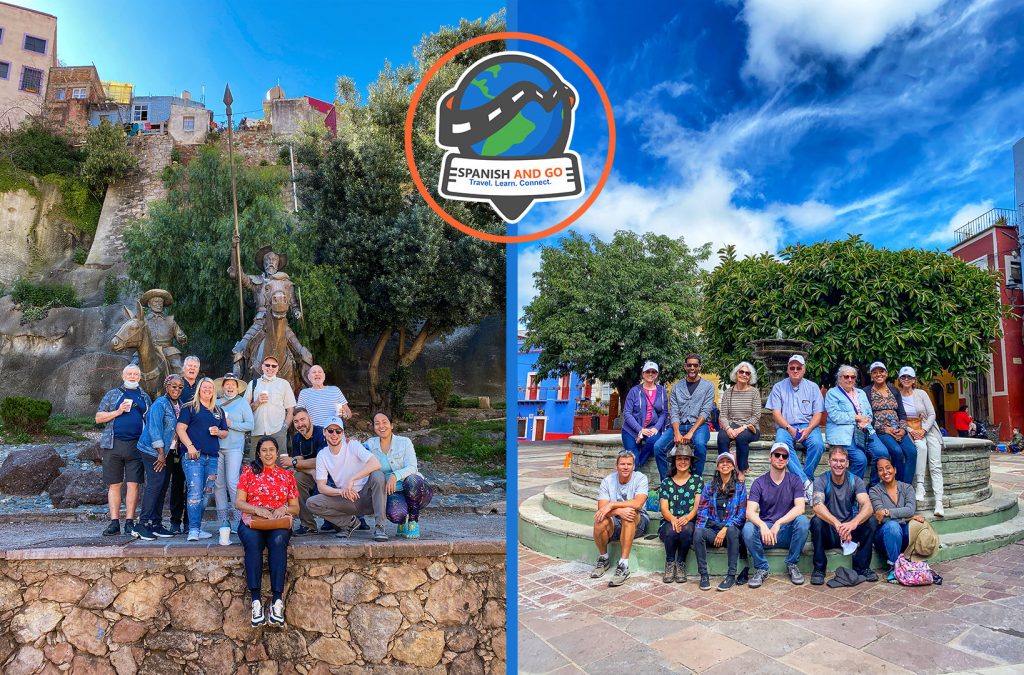How to Find the Best In-Person Immersion Program for You
It’s no secret that immersion is one of the best ways to learn a new language. But it’s not just about the amount of time you spend in another country; it’s about the quality of your experience and how well you’re able to integrate with locals and interact with the culture.
However, finding an in-person immersion program that fits your personality, schedule, and budget can be tricky – which is why we’ve decided to break down some of the options when it comes to language immersion programs.
Table of contents
Benefits of Learning by Immersion
Before I jump into the options, I want to quickly highlight the benefits of taking part in a language immersion program because they can be transformational when done right.
As the name would suggest, language immersion is a method of learning that involves immersing yourself in a foreign language, which can be done through living or studying abroad.
In this method, you study the language with native speakers and use it every day. This helps you learn the language quicker than if you were just studying it in class at home and your learning will feel effortless by comparison.
Learning a language by immersion is one of the most effective ways to learn, and it’s also one of the most fun.
You’ll Learn to Speak Quickly and Easily
Learning a language by immersion is one of the most effective ways to learn a language quickly.
When you are immersed in a language, you use it every day. It becomes part of your daily routine, and you start to pick up on little things in the language that you wouldn’t have noticed if you were just sitting in a classroom or reading a book. You see how people use the language in real-life situations, which helps you understand how to use it yourself.
Your brain learns things much quicker when it can experience things first-hand rather than through second-hand sources like textbooks or videos – and immersion allows for exactly that kind of experience!
You’ll Learn How to Speak a Language Like a Native Speaker
When you learn a language by immersion, you’re not just learning words and grammar; you’re also absorbing cultural nuances that help you understand how real native speakers use the language.
When you’re immersed in a different culture, your brain subconsciously picks up on all kinds of information about how people use their language – even things like tone and body language. This wealth of information cannot be picked up in a classroom and will equip you with all the information you need to communicate like a native speaker.
You’ll Get To Explore New Cities, Countries, and Cultures
One of the best things about learning by immersion is that it’s an opportunity to explore new cities, countries, and cultures.
Whether you do a short-term immersion retreat or a year-long study abroad, this can be a great way to get your feet wet in a new place. You’ll be able to interact with locals in their native language, which will make you feel like part of the community. You’ll also be able to learn more about their culture and the history of their community – especially if you do a homestay (more on homestays below).
It’s also a great way to get out of your comfort zone if you’re not used to traveling as you’ll have a community of teachers, students, and locals to rely on as you adapt and adjust.
You’ll Make Friends From All Over the World
When you go on a language immersion program, you get to meet people from all over the world. This is an incredible opportunity to meet people who have different perspectives than you do, and they’ll show you things about their home countries that might surprise you.
You’ll be able to discover what life is like for those who live in different parts of the world, which will help you open your mind and expand your horizons.
You’ll also be able to share stories with people who come from different backgrounds than you do, which can lead to some really eye-opening conversations.
Moreover, everyone will have their own language-learning tips and tactics, allowing you to pick up new methods of learning to help you hone your skills.
Who Are Immersion Programs Suited For?
Language immersion programs are ideal for those who have a strong interest in the language but aren’t sure where to start, or for those who have tried other methods and want a change of pace.
If you’re looking for something that’s more hands-on than traditional language classes, then this is definitely the option for you. You’ll get plenty of opportunities to use your new skills in real-world situations, which means your learning process will be much more fun and engaging than what you might experience in traditional classrooms.
There are numerous language immersion programs available, regardless of your age and available at a range of prices across a range of countries. Whatever your situation, if you have a keen interest in learning your target language and are willing to push yourself out of your comfort zone, there’s an immersion program that will work for you.
With that in mind, let’s take a look at the different types of immersion programs so you can decide what’s right for you.
Types of Language Immersion Programs
Find the type of immersion program that suits you best.
Homestay Programs
Language homestays are a great way to immerse yourself in the culture of where your target language is spoken. They are ideal for students who want to learn a language but aren’t able to go abroad for a semester or full year, or for those who don’t have the time or money to travel on their own.
Host families will typically be willing to host you for up to two weeks at a time and can provide you with meals and accommodation at no extra cost. You’ll also get to experience life in a different country through your host family’s eyes, which will help you practice your language skills as well as get an authentic taste of the local culture.
You’ll get more exposure to the local area and its culture/history than you would by staying in a hotel or hostel (like how locals do things!) and you’ll benefit from having someone who is there to answer any questions you might have.
Homestays are a great option if:
- You want to immerse yourself in a new culture, but can’t commit to months abroad.
- Your budget for learning a language is limited.
- You want the benefit of staying with a local who can show you the ropes.
Study Abroad Programs
Study abroad programs are designed to immerse students in a foreign culture and language whilst continuing their academic career.
These programs are particularly suited to students who have a strong interest in learning about another language and culture but want to stay on track with their academic goals.
Study abroad programs can be taken for course credit or for personal enrichment. Students who take study abroad programs for credit will be able to transfer these credits back to their academic institution, allowing them to stay on track with their graduation timeline. They usually last a single semester but are sometimes available for a full year.
Study abroad programs are a great option if:
- You’re a student looking to immerse yourself in a new culture while continuing your normal studies.
- You’re comfortable with the idea of moving to a new country for an entire semester, or even a year.
- You are enrolled in an academic institution that offers study abroad programs for course credit.
Language Immersion Retreats
Language immersion retreats are another great way to immerse yourself in a foreign language and culture. They’re usually short-term, in-depth programs that offer students the chance to focus exclusively on their language goals for a period of 1-2 weeks. They’re offered all over the world, but they’re particularly popular in Latin America.
The main draw of immersion retreats is that you can get a lot of language learning done without having to worry about the distractions of daily life—you won’t have to worry about planning all the little details like your itinerary, or where you’re going to stay. These are all included in the retreat price.
Some retreats include catering so you don’t even have to worry about making your own meals or cleaning up after yourself!
Basically, immersion retreats are a great way to get away from your day-to-day so you can dive into language learning without distractions.
They’re also ideal for people who want to experience culture first-hand. Many immersion retreats include tours, cooking or dancing classes, and activities that allow participants to really feel like they’re living in another country while they learn a new language.
For example, our Spanish and Go Immersion Retreat Program includes a guided culinary tour, so you can combine indulgence with learning!
Most immersion retreats are organized around small groups, meaning if you’re introverted by nature, immersion retreats offer a great way to meet new people without having to go out of your way to do so.
Language immersion retreats are a great option if:
- You want to immerse yourself in a new culture, but can’t commit to months abroad.
- You want an escape from daily life so you can focus entirely on your language learning.
- You don’t want to worry about planning accommodation, travel, etc.
- You want to learn about culture, as well as language.
- You would benefit from being part of a group of like-minded learners.
Register for a Class at a Language School
If you’re looking for a no strings attached way to get immersed in the culture of your target language, apply to a school that teaches exclusively in your target language.
This approach is only recommended for students who have no trouble scheduling their own accommodations and entering a new class by themselves as you’ll have to arrange these things yourself. These students need to be organized and self-reliant, as well as open to learning in a new environment.
A class at a language school is a great option if:
- You want to immerse yourself in a new culture, but can’t commit to months abroad.
- You have no trouble planning your own accommodation.
- You’re willing to enter a new learning environment by yourself.
- You have a limited budget.
The Bottom Line
When you’re learning a language by immersion, you’re surrounded by native speakers and you’re constantly hearing the language. This means that your brain is continually processing new information about the language and how it’s used.
This is an incredibly effective way to learn a new language because our brains are designed to recognize patterns. When we see those patterns repeated over time, our brains recognize them as normal and comfortable.
That’s why if you live in a country where people speak your target language as their first language, you’ll eventually find yourself speaking with them naturally—without even thinking about it!
There are a variety of types of immersion programs suited to different circumstances and personalities, meaning there is no excuse not to push yourself out of your comfort zone and level up your language skills today!
FAQ
How Long Does It Take To Learn a Language Through Immersion?
While the language learning process never truly finishes, the speed with which you’ll be able to achieve fluency depends on your existing language level and the amount of time you devote to learning while on an immersion experience.
If you have been studying Spanish for a few years, it may take as little as three weeks for immersion to help you become fluent. If you are a complete beginner, it could take up to six months.
Either way, the fact is that immersion drastically improves your language skills and will help you become fluent much, much faster.
How Effective Are Language Immersion Programs?
Language immersion programs are effective for a lot of reasons.
First, they allow you to practice your target language in the real world. This means that you get a more authentic experience of the language than you would if you were only learning from books.
Second, they provide lots of opportunities for you to interact with native speakers—and not just any native speakers: your instructors! They’re going to be able to give you feedback on what they think works well and what doesn’t, so you can improve as much as possible.
Third, they give you a chance to learn in a fun environment that’s not scary or intimidating! Language immersion programs tend to be very relaxed and low-pressure (if not completely laid back), which makes it easier for even shy people to make friends and feel comfortable speaking their target language.
What Are the Disadvantages of Immersion Programs?
Immersion programs require a lot of effort from students. They need to make sure they are practicing their language skills outside of class as well as inside of class if they want to make good progress.
Immersion programs are also time-consuming and can be difficult to fit into your life. They often require a lot of travel and time away from home or work, so it’s important to make sure you have enough vacation time saved up before signing up for one!












Social